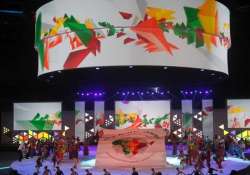PM Modi holds bilateral meetings with 41 visiting African leaders
New Delhi: Prime Minister Narendra Modi called for India and Egypt to work together on reforms to UN Security Council as cooperation in counter-terrorism, agriculture, oil and energy figured in many of his bilateral meetings

New Delhi: Prime Minister Narendra Modi called for India and Egypt to work together on reforms to UN Security Council as cooperation in counter-terrorism, agriculture, oil and energy figured in many of his bilateral meetings with 41 visiting African leaders who had come to take part in the India-Africa Forum Summit (IAFS).
Briefing about Modi's meetings on Thursday with 10 African leaders including Egyptian President Abdel Fattah Al-Sisi, external affairs ministry spokesperson Vikas Swarup said that the Egyptian president had agreed as a goodwill gesture to release two Indian prisoners who had been in jail in Egypt for 16 and 22 years, and they will be extradited to India.
Modi had bilaterals will all visiting heads of state and government. He met with 19 African leaders on Wednesday and had 12 bilaterals on Friday. IAFS, which saw participation from all African countries including 41 heads of state and government, concluded on Thursday.
In his meeting with Egyptian president on Thursday, Modi thanked him for attending the summit, saying it would have been incomplete without his country.
Also Read: India makes common cause with Africa ahead of climate meet
Modi met Moroccan King Mohammed VI on Thursday and agreed to his suggestion of forming a high-level joint commission. The king invited Modi to visit his country.
There was dicussion on UNSC reforms in Modi's meeting with Namibian President Hage G. Geingob, who held that "powerful countries like India should be in the Security Council".
Malian President Ibrahim Boubacar Keita invited Modi to visit his country and offered to take him to Timbuktu, which he said was a heritage site which terrorists had threatened to blow up.
Modi invited Mauritanian President Ould Adbel Aziz to join solar alliance that he proposes to launch during meeting on climate change in Paris later this year. Aziz said his country was rich in copper, oil, iron and gold and said they will open an embassy in Delhi to boost relations between two countries.
Ethiopian Prime Minister Hailemariam Dessalegn said India can take advantage of arable land in his country for growing pulses and oilseeds.
Modi and Angolan Vice President Manuel Domingos Vicente discussed cooperation in oil sector. Referring to presence of diamonds in Angola, Modi said that India was largely sourcing diamonds for its industry from third parties and it will be a win-win situation for both countries if it gets access to them directly.
Tanzanian Vice President Mohamed Gharib Bilal sought India's assistance for construction of a rail line.
Somalian President Hassan Sheikh Mohamoud sought India's assistance in energy sector.
Modi invited Comoros' President Ikililou Dhoinine to join the proposed solar alliance.
In his meeting with Sisi, Modi and him also discussed the situation in the Middle East and the need for more active cooperation in "counter-terrorism". It was Modi's second meeting with the Egyptian president in two months. Sisi said that though the summit was coinciding with parliamentary polls in Egypt, he made it a point to attend the "very important occasion", noting there were very sound historical foundations of ties with India and he wanted to take them to a much higher level.
On Friday, Modi had bilaterals with Sudanese President Omer el Bashir, Liberian President Ellen Sirleaf, Sierra Leone President Ernest Bai Koroma, Madagascar President Hery Rajaonarimampianina, South Sudanese President Salva Kiir Mayardit, Senegalese President Macky Sall, Guinea Bissau President Jose Mario Vaz, Mauritius Prime Minister Anerood Jugnauth, Rwandan Prime Minister Anastase Murekezi, Zambian Vice President Inonge Winaat, Gambian Vice President Aja Isatou Njie Saidy, and Burundian Vice President Gaston Sindimwo.